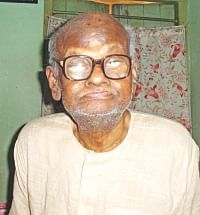The songsmith who inspired freedom fighters

The man whose powerful lyrics kept up the freedom fighters' morale during our Liberation War is no more.
Govinda Halder, best known for penning songs like Mora Ekti Phulke Bachabo Bole Juddho Kori; Ek Sagor Rokter Binimoye Banglar Swadhinata Anlo Jara and Purbo Digonte Surjo Uthechhe, breathed his last at a clinic in Kolkata yesterday.
He was 84.
These songs, broadcast on Swadhin Bangla Betar Kendra in 1971, bolstered the nation's resolve for freedom. They indeed served as the biggest source of inspiration for our freedom fighters whenever their spirits sank low due to the loss and brutalities they had endured at the hands of a well-equipped Pakistan occupation force.
Halder, who had always kept a low profile, had been suffering from a kidney disease and old age complications. As his health deteriorated, he was admitted to the Jitendra Narayan Roy Polyclinic on December 13 last year.
During his visit to India last month, President Abdul Hamid had met him at the hospital and enquired about his health and treatment.
“He is one of us. He is a Muktijoddha, a brave soldier,” Hamid told reporters.
Learning about his illness, Prime Minister Sheikh Hasina called him and took the responsibility of taking care of his treatment expenses as his family was struggling to bear the cost.
Halder appeared like a saviour when there was a need for new inspirational songs to bolster the confidence of the resisting freedom fighters after the Pakistan army had launched its genocide campaign in March 1971.
Mora Ekti Phul Ke Bachabo Bole Juddho Kori was aired on Swadhin Bangla Betar Kendra in the first week of June. His other masterpiece – Ek Sagor Rokter Binimoye – was written immediately after the war, which, to this day, is regarded as one of the greatest tributes to our martyrs.
Halder, who had visited Bangladesh once in 1972, had written nearly 3,500 semi-classical, folk, baul, kirtan and modern Bangla songs before glaucoma impaired his sight and writing capacity.
Artists from All India Radio and Doordarshan did also sing some of his songs from other genres but Halder never got the acknowledgement he deserved. Most of his works, both songs and poetry, remain unpublished and unknown.
Halder's first book on poetry had been a success. The 500-odd copies that the writer had managed to print in 1989 sold out. Unfortunately, he did not have the means to reprint Door Digonte, a collection of his poems.
His daughter Gopa Halder informed The Daily Star that about 3,000 songs of his father were yet to be published.
Successive Bangladeshi governments failed to give him due recognition. It was not until 2012 that Halder was conferred the Friends of Liberation War Award in Dhaka. Unfortunately, he was not able to receive the honour due to his feeble health. His daughter, Gopa Halder, received the award to a standing ovation.
According to a book written by Belal Muhammad, there was a rule during the war that no foreigner could write or perform songs for the Swadhin Bangla Betar Kendra. Halder's name was thus removed from the title list. Even after Bangladesh gained independence, his name remained absent from the credit list.
“In June 1972 I went to Bangladesh to inform the Bangladesh Betar authorities about my concerns. After a bilateral agreement, they signed me on as an official lyricist and finally my name appeared on the title list of the songs,” wrote Halder in an article published in Tarokalok in 1985.
In his article, he lamented that even though the Betar made an agreement with him, he didn't get any royalties from the authorities concerned. “They sent me vouchers from 1972 to 1973. I signed them. But despite that, they deprived me of the modest remuneration,” he wrote.
Halder was born in India's Bongaon in August 1930. After schooling in Bongaon, he did his graduation and post-graduation in Bangla from Calcutta University. Later, he joined the income tax department and retired in July 1988, said Gopa.
Both President Abdul Hamid and Prime Minister Sheikh Hasina expressed their profound shock at the death of Govinda Haldar. They prayed for the eternal peace of his departed soul and conveyed deep sympathy to the bereaved family.
Halder, who is survived by his wife Parul Halder and daughter Gopa, was later cremated at Neemtola crematorium, reported our New Delhi correspondent.
Halder is no more. But his songs will remain in our hearts forever and they will continue to inspire us whenever we as a nation will be beset with turbulent times.

 For all latest news, follow The Daily Star's Google News channel.
For all latest news, follow The Daily Star's Google News channel. 



Comments